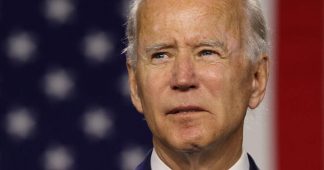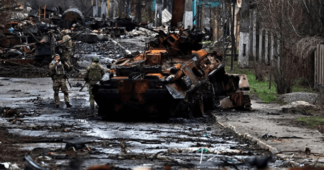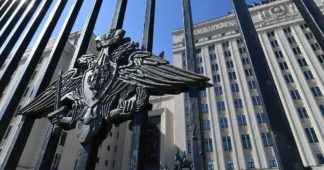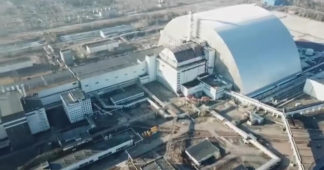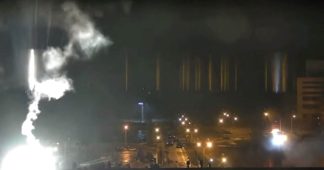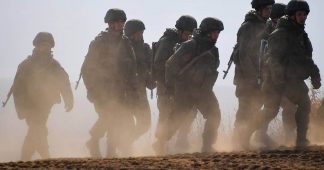By Clara Weiss
This weekend, a major campaign over alleged war crimes by Russian troops in Bucha, a city of about 28,500 inhabitants northwest of Kiev, swept the Western press.
The campaign marks a significant escalation of the war in Ukraine and comes right after Russia reported that two Ukrainian helicopters had entered Russian territory and bombed an oil depot in Belogorod on Friday.
The campaign is based on allegations by the Ukrainian authorities and army that Russian troops, while being in control of Bucha, tortured and murdered large numbers of civilians, with figures cited in press articles ranging widely, from a few dozen to over 400. Several bodies were reportedly found in ditches. Human Rights Watch has published a report, based on interviews with eyewitnesses in Bucha and other towns, that described rape and forms of torture, and called for an investigation into these as “war crimes” by Russian troops.
The Kremlin has denounced the claims of atrocities against civilians as a “provocation by Ukrainian radicals” and has called for an emergency meeting of the UN Security Council on Monday. The Russian Foreign Ministry has pointed out that Russian troops had withdrawn from Bucha by Wednesday, March 30, one day after Russia had promised at peace negotiations that it would dramatically reduce its forces near Kiev.
The Kremlin also noted that a video message by Bucha’s mayor from March 31 makes no reference to any atrocities and that the images and reports only started circulating after Ukrainian troops and television had entered the town on Saturday, April 2.
The video message by Anatoly Fedoruk, indeed, shows the mayor exalted, proclaiming that all “Russian orcs”, as he called the Russian troops, had left the town, without any mention of atrocities or war crimes having been committed.
While the facts of what happened in Bucha and who perpetrated what crimes remain murky, two things are clear: First, the campaign brings the cynical hypocrisy of the imperialist powers over war crimes to a new level; and, second, it is used to significantly escalate the war.
The same imperialist powers that are now crying “shock” and “horror” at unproven allegations over killings by the Russian army have reduced large parts of the Middle East and North Africa to ruins. US wars since 2001 alone have claimed, according to conservative estimates, between 3 and 4 million civilian casualties.
In fact, the rhetoric of the press campaign over Bucha and the claims of a “genocide” and “atrocities” bear the hallmark of the imperialist propaganda that has preceded the launching of or the escalation of countless wars in defense of “human rights” since 1991, including in Yugoslavia, the Middle East and North Africa.
A few recent cases, however, should be recalled:
· The Kunduz Massacre in 2009, the single biggest war crime of the German army since the end of World War II, which resulted in at least 90 civilian deaths.
· The US siege of Mosul, Iraq, in 2014, that claimed an estimated 40,000 lives.
· The destruction of Raqqa, Syria, in 2017, by US forces, with over 1,600 civilian casualties.
In none of these cases, which have by now been abundantly documented, were those responsible held to account. Julian Assange, who has exposed some of the most horrendous crimes by US imperialism, has been cruelly tortured and confined for over a decade at the behest of Washington. He is now being threatened with extradition to the US and a 175-year prison sentence.
It should also be noted that on Thursday, Human Rights’ Watch published a report indicating that Ukrainian troops may have committed war crimes by shooting Russian prisoners of war in their legs and filming it. The Ukrainian army has, in fact, publicly announced such war crimes and has been engaged in a weeks-long social media campaign, sharing images of killed Russian soldiers. This itself constitutes a violation of the Geneva Convention for the humane treatment of prisoners of war. Of this, however, there has been almost no word in the Western press.
The campaign over Bucha now serves as the basis for a significant escalation of NATO’s proxy war with Russia in Ukraine, just days after both Russian and Ukrainian negotiators evaluated peace negotiations as “positive.”
The response in Germany has been particularly hysterical. Germany’s Chancellor Olaf Scholz described the dead bodies in Bucha as “a war crime” and announced further weapons deliveries to Ukraine as well as sanctions by NATO against Russia in the coming days.
Writing for the liberal Süddeutsche Zeitung, Stefan Kornelius raged that the “revelations” of dead bodies in Bucha showed that Ukraine was subject to “a war of annihilation,” directly comparing the ongoing war to Hitler’s invasion of the Soviet Union in 1941. This is a conscious minimization and relativization of the crimes of German imperialism in World War II. As part of Hitler’s war of annihilation against the Soviet Union, the Nazis occupied Soviet Ukraine, killing over 5 million Ukrainians, among them 1.5 million Ukrainian Jews.
Ukrainian nationalists, the antecedents of the Azov Battalion and other paramilitaries that are now functioning as shock troops by the imperialist powers and the Kiev government, participated in these crimes, perpetrating massacres against Jews, Poles and civilians who opposed fascism.
Now, the German ruling class is again relying on these far-right forces and seizes on the war as an opportunity to ram through a record 100-billion-euro war budget, tripling the country’s defense spending—something not even Hitler dared to do after coming to power in 1933.
Ukraine’s President Volodymyr Zelensky called the dead bodies in Bucha evidence of an unfolding “genocide” and effectively ruled out any significant progress in peace negotiations, stating, “We can only have peace by fighting.” His foreign minister, Dmytro Kuleba said that now there could be no more hesitation about further weapon deliveries to Ukraine, “We need weapons—now!”
In fact, Ukraine has been flooded with weapons by NATO, especially the US and now also Germany, which is sending tanks, drones and anti-tank weapons. According to the Washington Post, the Biden administration has spent $2.3 billion on “defense support” for Ukraine since coming into office. Of these, $1.6 billion were committed in the first five weeks of the war.
Last week, Biden announced another $500 million of “budget aid” for Ukraine. On Saturday, the Pentagon pledged yet another $300 million for military equipment, including drones, armored vehicles and machine guns.
These massive weapons deliveries have already had a major impact on the war. Even judging by figures provided by the Kremlin, Russian military casualties (1,351) are higher than the official Ukrainian civilian death toll, which stands at 1,232. However, the real death toll among Russian soldiers is widely believed to be much higher, with the Pentagon estimating that 7,000 Russian troops may have been killed.
According to the Economist, Russian generals are dying at a rate unprecedented since World War II. Reports suggest that as many as 18 high-ranking military commanders have been killed in combat, including several generals.
While the Economist cited a number of possible reasons for the high exposure of Russia’s highest-ranking military—including poor equipment, logistics, and morale among troops—the report also noted that NATO was likely helping Ukraine in intercepting Russian military communication and locating troops. Moreover, the Economist referenced a report by Yahoo News that revealed many years of US training of Ukrainian paramilitaries, including snipers. One former American official told Yahoo News, “I think we’re seeing a big impact from snipers … the training really paid off.”
Published at www.wsws.org
We remind our readers that publication of articles on our site does not mean that we agree with what is written. Our policy is to publish anything which we consider of interest, so as to assist our readers in forming their opinions. Sometimes we even publish articles with which we totally disagree, since we believe it is important for our readers to be informed on as wide a spectrum of views as possible.
